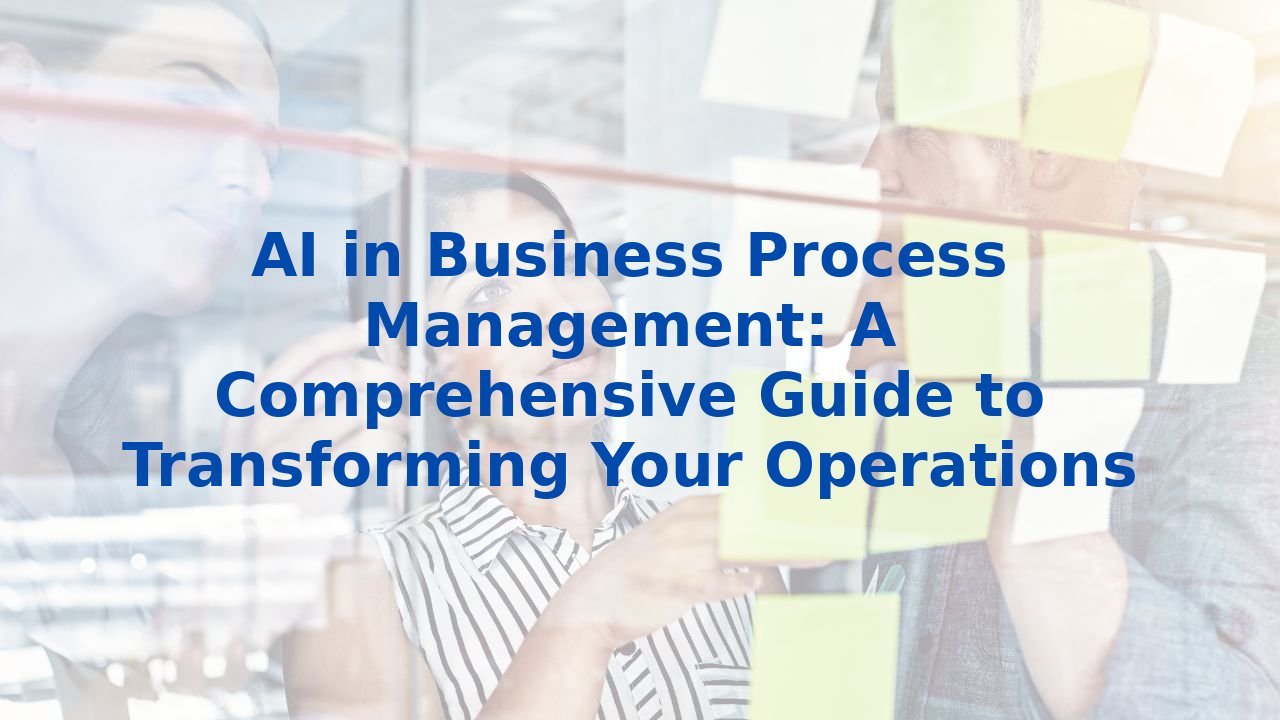AI in Business Process Management: A Comprehensive Guide to Transforming Your Operations
The Transformative Role of AI in Business Process Management
Introduction
In an era where time is money, businesses are perpetually on the lookout for that elusive edge—higher efficiency, reduced costs, and optimal decision-making. Enter Artificial Intelligence (AI). By weaving AI into the fabric of business process management (BPM), organizations unlock the potential to streamline operations, automate tedious tasks, and harness data-driven insights for smarter choices. Let’s peel back the layers and explore how AI reshapes BPM, highlighting the myriad benefits it brings to the table.
Process Discovery and Mapping
Imagine starting a journey without a roadmap—you might reach your destination, but not without a few detours. AI, acting as a resourceful guide, transforms the initial steps of BPM through process discovery and mapping. Techniques such as process mining and natural language processing empower organizations to reveal existing workflows, exposing inefficiencies and bottlenecks that often fly under the radar. By providing accurate and current process maps, AI sets the stage for successful optimization and continuous improvement.
Process Automation
One of the standout features of AI is its capability to automate repetitive manual tasks. Picture a workforce where employees are freed from mundane chores, allowing them to invest their energy into strategic and creative endeavors. Automation not only mitigates the occurrence of human error but also propels productivity and efficiency to new heights. With AI bots taking the reins on routine processes, companies can redirect their focus toward innovation and growth.
Continuous Monitoring and Improvement
AI's ability to continuously monitor processes serves as an invaluable asset. By analyzing historical data, AI can trigger alerts for potential issues before they escalate, offering businesses the chance to enact proactive measures. With tools for predictive modeling and root cause analysis, AI provides actionable insights that empower organizations to implement sustainable improvements. It's like having a 24/7 watchdog ensuring processes run smoothly and efficiently.
Enhanced Decision-Making
Fast decision-making can often shape the trajectory of a business. Here, AI shines by uncovering trends, predicting outcomes, and pinpointing underlying causes. By automating data analysis, companies save countless hours previously spent poring over spreadsheets. The result? Teams can turn their focus toward refining strategies rather than being buried under data. This agility in decision-making helps organizations realign their goals and adapt rapidly to market changes.
Real-Time Process Simulation
AI doesn’t just predict; it simulates. This capability empowers organizations to visualize process changes before they occur. Through machine learning and deep learning algorithms, AI can identify patterns and simulate potential outcomes based on historical data. This foresight enables businesses to calculate key performance indicators (KPIs), uncover bottlenecks, and assess the impact of changes, ensuring they remain agile and responsive to evolving demands.
Customer Service and Sales Optimization
The influence of AI extends to the heart of any organization: customer service and sales. Through AI-driven chatbots, businesses can handle basic inquiries, allowing human agents to focus on more complex issues. Moreover, advanced AI systems can sift through customer feedback, illuminating areas ripe for enhancement. In sales, AI optimizes performance by recommending effective channels, suggesting upsell opportunities, and prioritizing leads—boosting revenue while elevating customer experiences to new heights.
Training Employees for AI
Yet, AI's extraordinary prowess isn't solely reliant on its capabilities—it's about the synergy between AI and human expertise. Training employees to work effectively with AI systems is paramount. Understanding how to interpret AI-driven insights and implement them in decision-making fosters an environment of growth and continual learning. Investing in such training not only uplifts individual skill sets but also nurtures a collective culture that prioritizes innovation and adaptability.
Conclusion
The marriage of AI and business process management paves the way for a future replete with opportunity. From enhancing process discovery and automation to fostering continuous monitoring and data-driven decision-making, organizations that embrace AI stand to reap substantial rewards. However, as we ride the wave of technological advancement, it's imperative that businesses also focus on empowering their workforce through training. By doing so, companies can ensure they harness the full power of AI as it transforms their operations.
Ultimately, those who embrace AI-driven BPM will streamline their operations, enhance customer satisfaction, and pave the way for data-informed decisions. The future is clear: AI is shaping the landscape of business process management, and those ready to adapt and evolve will undoubtedly emerge as leaders in their fields.



